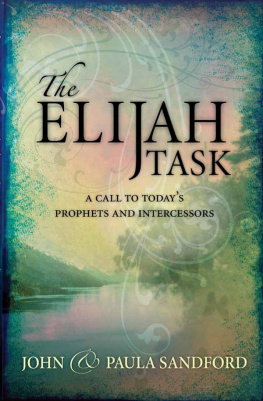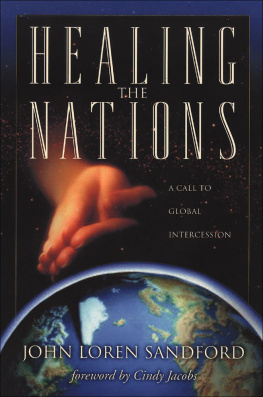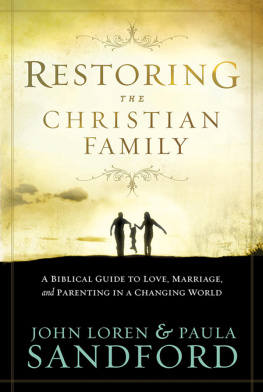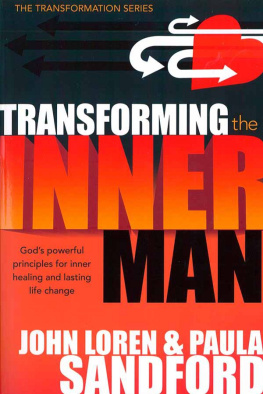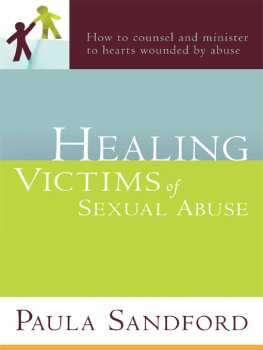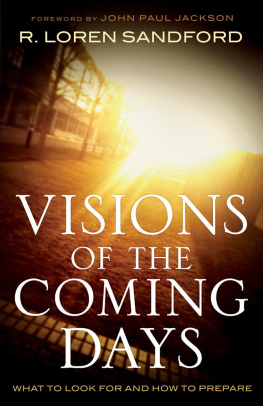
Chapter 3
To Restore All Things
How Firm a Foundation, from John Rippons Selection of Hymns, 1787. Public domain.
Merlin R. Carothers, Power in Praise (N.p.: Merlin R. Carothers, 1980).
Onward Christian Soldiers, by Sabine Baring-Gould. Public domain. Italics addedfor emphasis.
Chapter 4
The Call of a Prophet
Kenneth E. Hagin, I Believe in Visions (Tulsa, OK: Faith Library Publications,1984).
Chapter 5
The Discipline and Training of a Prophet
Watchman Nee, The Release of the Spirit, reissue edition (N.p.: Christian FellowshipPublishers, 2000). Watchman Nee, The Spiritual Man, Vol. 1 (N.p.: Christian FellowshipPublishers, 1968).
Chapter 6
Lessons in Prophecy From the Story of the Woman at the Well
Jesus Loves Me, by Anna B. Warner. Public domain.
Joachim Jeremias, Jerusalem at the Time of Jesus (Philadelphia, PA: Fortress Press,1962), 370.
Craig S. Keener, The IVP Bible Background Commentary, New Testament (Downers Grave,IL: InterVarsity Press, 1993), 274.
James M. Freeman, Manners and Customs of the Bible, (Plainfield, NJ: Logos International,1972), 424.
Chapter 7
The Proper Discharge of the Prophets Duty
David Wilkerson, The Vision (New York: Pillar Books, 1975).
William Shakespeare, Hamlet, Act I, scene V.
Chapter 9
The Stopping Place
Quote attributed to Sir Walter Scott.
Chapter 10
The Creative Power of the Word in Prayer
(accessed April 20, 2006).
(accessedApril 20, 2006).
(accessed April20, 2006).
(accessed April 20, 2006).
Chapter 11
Prelude to Listening
(accessed April 21, 2006).
Hobart Freeman, Angels of Light? (Warsaw, IN: Faith Ministries and Publications,1969), 28.
J. R. R. Tolkien, The Lord of the Rings, 50th anniversary one-volume edition,(New York: Houghton Mifflin Company, 2004), 50.
C. S. Lewis, The Horse and His Boy, reprint edition (New York: HarperCollins Publishers,1994), 151152, italics added.
Bob Mumford, Take Another Look at Guidance (N.p., Logos International, 1971).
Lewis, The Horse and His Boy, 202, italics added.
Kenneth E. Hagin, Ministering to the Oppressed, 2nd edition (Tulsa, OK: FaithLibrary Publications, 1985), 4.
Chapter 14
Dark Speech, Gods Strange and Joyous Way of Speaking to Man
Nivo Lo Bello, Saga Magazine 48(5), August 1974.
Chapter 15
Mouth to Mouth, Clearly, and Audible Speech
My God and I, Latvian hymn. No further information available.
Chapter 16
Balaams Ass, and Other Surprising Things
J. Allen Boone, Kinship With All Life (San Francisco: HarperSanFrancisco, 1976).
Other Books by
John and Paula Sandford
Transforming the Inner Man
Growing Pains
Gods Power to Change
Letting Go of Your Past
Healing for a Womens Emotions
Why Good People Mess Up
Choosing Forgiveness
Awakening the Slumbering Spirit
Restoring the Christian Family
Healing Victims of Sexual Abuse
Renewal of the Mind
For further information, contact:
Elijah House, Inc.
317 N. Pines Road
Spokane Valley, WA 99206
Web site: www.elijahhouse.org

T he office of the Christian prophet is not to be confused with the gift of prophecy.The gift of prophecy is an immediate word from the Lord to the church in meetingsfor direction, exhortation, rebuke, or consolation. The Holy Spirit may speak thusthrough any person. However, such speaking does not commission the prophet of themoment to the standing office.
A Christian prophet is a watchman. His task upon the walls of the city of God claimshim entirely. God acts in and through all that we are. In everything a prophet is,the Spirit of God lives and moves and acts. We shall see this also means that theChristian prophets very life and breath is intercession within the church.
The office of the prophet, alone among the offices of the New Testament, is fullydeveloped in the Old. For example, the office of apostle seems entirely new. Teachersexisted before, though we hear little of them. Healers were known, though often thehealer was also the prophet. Pastors or shepherds are spoken of, as in Jeremiah 23,but again who were they thenpriests? Prophets? Or both? Prophecy and the officeof prophecy, however, were not only fully developed but also central to the Lordsplan. In and through His prophets He warned, scolded, blessed, healed, taught, foretold,called Israel to repentance, subdued froward kings, laid down revelation for doctrine, chastised, and rescued. Every book from Isaiah to Malachi is written by or abouta prophet.
God did not do away with prophets and prophecy when Jesus came and the church wasborn. Instead He expanded their function and power by virtue of the cross and resurrection.So the prophet ceased to be a lonely watchman who was often put to death by his ownpeople, and he became an integral part of the church that, by the guidance of theHoly Spirit, learns to protect and cherish its prophets. And even though the fleshmay deafen the churchs ear to its prophets, they no longer seem to be in imminentperil of their lives as were their Old Testament counterparts.
The Christian prophet, like all Christians, has absolutely no power in himself. Allthat he accomplishes must be done by the Holy Spirits power. To the extent thathe neglects this fact, he will fail.
God the Father is a God of order, not of confusion (1 Cor. 14:33since it is beingcontrasted with the word disorder, the word peace can be interpreted as order.).His first acts of creating and dividing brought order out of chaos. Therefore wemust discard the notion of wild-eyed, scatterbrained prophets. In 1 Samuel 9:6, 9,Samuel is distinguished from the ecstatic, among whom Saul is categorized in 1 Samuel10. The prophets of the Old Testament sometimes indeed did weird things, like goingnaked and barefoot (Isa. 20), marrying prostitutes (Book of Hosea), or wearing oxyokes (Jer. 2728), but these were by command of the Lord in order to startle theconscience of the people. Old Testament prophets were men of discipline, wisdom,counsel, and insight, not of wild ecstasy.
In the Old Testament God did not act unless He first informed His prophets (Amos3:7). Under the new covenant the body of Christ needs prophets more than ever, forthe Father will not act without the seeing cry of the watchmen summoning the bodyto give Him no rest in ceaseless prayer until He establishes Jerusalem (the church)and makes it a praise in the earth (Isa. 62:67).
It will not suffice to say, We have the Scriptures; prophets are no longer needed.That would be the same as saying to a general in battle, We need not respond toyour couriers; we have the original battle plans, drawn up before the war began!Present interpretation and fresh revelation are always needed for life with a livingGod.
A tremor of anticipation has raced through the church these days as the Holy Spirithas prompted teacher after teacher to speak on unity, authority, and discipleship.The least perceptive can see that the Lord is making His church ready for the finalchapter of history. We all need to be under authority. Thus we need apostles. Weneed prophets. God has provided groundwork for such leaders throughout the New Testament(Acts 15:16, 2223; 1 Cor. 12:28; 15:79; Eph. 2:20; 3:5; 4:11; 1 Thess. 2:7; Rev.18:20). The church is presently, now, not merely in the first century, built uponthe foundation of the apostles and prophets, Jesus Christ himself being the chiefcorner stone (Eph. 2:20).
Next page
